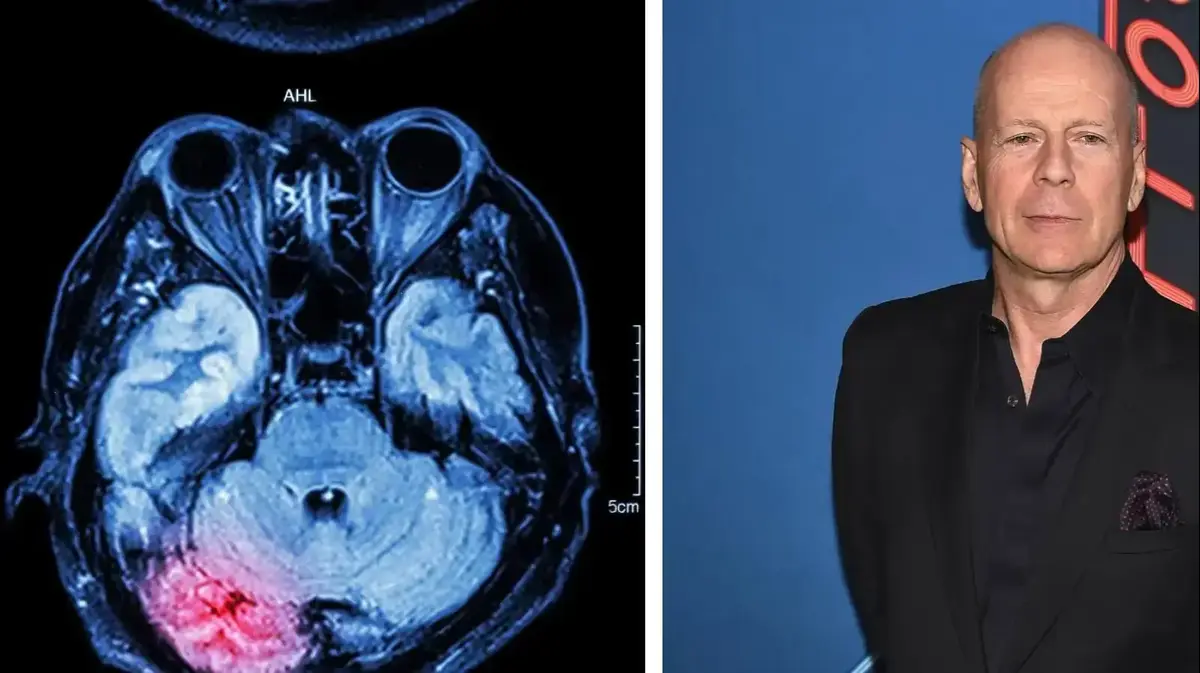Frontotemporal dementia, the diagnosis that Bruce Willis received 0:39
(CNN) --
After Bruce Willis retired from acting in March 2022 with a speech disorder called aphasia, the 67-year-old actor was diagnosed with frontotemporal dementia, his family announced Thursday.
"Since we announced Bruce's aphasia diagnosis in the spring of 2022, his condition has progressed," the Willis family said in a statement.
“Unfortunately, the communication challenges are just one symptom of the illness Bruce is facing.
Although this is painful, it is a relief to finally have a clear diagnosis," the statement added.
Bruce Willis's family shares a new diagnosis about his health: he suffers from a form of dementia
Frontotemporal dementia (FTD) refers to a group of disorders caused by a buildup of tau and other proteins that destroy neurons in the brain's frontal lobes (behind the forehead) or temporal lobes (behind the ears).
The condition usually appears between the ages of 45 and 64, according to Alzheimer's Research UK.
“It is the most common type of dementia for people under the age of 60.
FTD can cause communication problems, as well as changes in behavior, personality, or movement," according to a statement from the Association for Frontotemporal Degeneration.
People with FTD typically live six to eight years with this condition, according to the US National Institute on Aging. Between 10% and 30% of FTD cases are hereditary.
Apart from genetics, there are no other known risk factors, although researchers are studying what role the thyroid and insulin may play in the onset of the disease.
advertising
What are the types of DFT?
Because his symptoms began with a slurred speech, Bruce Willis' case could be classified as a type of FTD called primary progressive aphasia, said Dr. Henry Paulson, a professor of neurology and director of the Michigan Alzheimer's Disease Center at the University of Michigan.
Bruce Willis's wife shares a video of the actor playing basketball
“Aphasia really means problems with language.
And that can range from having trouble finding words to understanding what people are saying.
It can occur due to a tumor in the brain, a stroke, or a progressive neurodegenerative condition," Paulson explained.
"Because his diagnosis is frontotemporal dementia, Mr. Willis clearly has a progressive neurodegenerative disease rather than a stroke or a tumor or some other lesion in the brain," he added.
There are two other types of DFT.
The behavioral variant of frontotemporal dementia is characterized by changes in the functions of execution, thinking, and planning.
Another class of frontotemporal dementia affects motor neurons and can manifest as an inability to swallow, stiff muscles, and difficulty using the hands or arms to "perform a movement despite normal force, such as difficulty closing buttons or operating small appliances," according to the National Institute on Aging.
What are the symptoms of FTD?
At first, it can be difficult to know exactly what type of FTD a person has, or even if it is that specific dementia, because the symptoms and the order in which they appear can vary from person to person.
It also depends on which parts of the front or temporal lobes are affected.
In behavioral DFT, people rarely have memory problems.
Instead, they have difficulty planning and sequencing their thinking, and they have trouble setting priorities, according to the National Institute on Aging.
They may parrot the same activity or word over and over again, lose interest in life, and act impulsively, saying inappropriate words or doing things that others may perceive as embarrassing.
In primary progressive aphasia, the person may have trouble speaking or understanding words.
He can also slur his words.
Over time, they may not recognize familiar faces and objects.
Some can become mute.
Walking this number of steps a day may reduce your risk of dementia
Primary progressive aphasia "can start with word-finding difficulties, so people start using simpler or more generic words for things they can't remember," Paulson said.
"That also comes with the territory of aging, but when language requires more effort on a daily basis, or comprehension goes downhill, that's a sign that someone should see a doctor for an evaluation," he said.
Motor neuron FTD disorders may not affect memory, cognition, language, or behavior, especially initially.
Early signs may include the inability to control movements or problems with balance and gait.
A hallmark of one such disorder, progressive supranuclear palsy, is difficulty looking down or making other eye movements.
How is FTD diagnosed?
To diagnose FTD disorders, a neurologist will perform a careful clinical examination, along with psychological tests designed to assess cognitive abilities, Paulson said.
“An MRI of the brain can tell us if certain parts of the brain are shrinking or showing signs of atrophy.
We'll do some blood tests to make sure we're not missing some treatable causes of cognitive decline, like thyroid disease or vitamin B12 deficiency,” he said.
“And often, we also image brain metabolism,” Paulson said.
"It's the positron emission tomography or the PET scan, and that can tell us which parts of the frontal lobes or the temporal lobes are involved."
How is FTD treated?
Unlike Alzheimer's disease, there are no current therapies to slow the progression of FTD.
Medical professionals may attempt to improve a patient's quality of life by prescribing medications to reduce agitation, irritability, or depression.
A speech-language pathologist can help determine the best strategies and tools for a FTD patient struggling with language skills.
Physical or occupational therapy, guided by a doctor specializing in these disorders, can help with movement symptoms.
“It's really important for people who have progressive dementia syndrome like FTD to continue to eat right, exercise regularly and keep in touch with people.
Those activities aren't medicines, they don't cure disease, but they can help your brain work as well as it can,” Paulson said.
As the disease progresses, patients can continue to lead active and fulfilling lives, adapting to their symptoms in inspiring ways, he added.
“I have seen patients completely lose their speech, and yet they go out and grab their camera and take beautiful pictures of the life they are living.
They can't tell me with words, but they can tell me with pictures," Paulson said.
“I tell all my patients, 'Don't let this disease take over.
Take charge,'” she added.
“Sure, you have lost some skills due to the disease you have, but you still have a lot of skills left and you work with the skills you have.”
Bruce Willis






